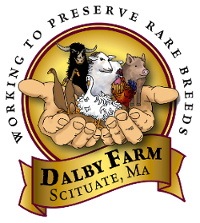The Importance of Preserving Heritage Animal Breeds
We get this question a lot! And often times, people are a bit puzzled by our answer. I hope to make it a bit more clear in this post :)
One of the most compelling reasons to preserve heritage animal breeds is the unique genetic diversity. Over centuries, these animals have developed traits and characteristics that make them well-suited to specific environments and tasks. Whether it's the hardy resilience of a heritage breed of cattle or the superior foraging abilities of a heritage breed of poultry, each animal possesses a genetic legacy that is irreplaceable.
This genetic diversity is not just a relic of the past; it is a vital resource for the future. In a world increasingly threatened by climate change and environmental degradation, preserving diverse genetic resources is essential for ensuring the resilience and adaptability of our food systems. Heritage animal breeds, with their diverse genetic makeup, hold the key to developing livestock that can thrive in a changing climate, resist diseases, and maintain ecosystem balance.
Furthermore, preserving heritage animal breeds is essential for safeguarding cultural heritage and traditional knowledge. Many heritage breeds are deeply intertwined with the cultural identities of communities around the world. From the majestic Highland cattle of Scotland to the iconic Nubian goats of Africa, these animals are living links to our shared heritage and ancestral traditions. By preserving these breeds, we honor the wisdom of past generations and ensure that future generations will have the opportunity to connect with their cultural roots.
In addition to their cultural significance, heritage animal breeds also play a crucial role in promoting sustainable agriculture and local food systems. Unlike their commercial counterparts, which are often bred for maximum productivity at the expense of other considerations, heritage breeds are well-adapted to small-scale and sustainable farming practices. They require less intensive management, have lower input requirements, and contribute to the preservation of traditional farming methods that prioritize animal welfare and environmental stewardship.
In conclusion, the importance of preserving heritage animal breeds cannot be overstated. These animals are not just relics of the past; they are living treasures with the potential to shape our future. By safeguarding their genetic diversity, preserving their cultural heritage, and promoting their role in sustainable agriculture, we can ensure that these invaluable resources continue to enrich our lives for generations to come.
